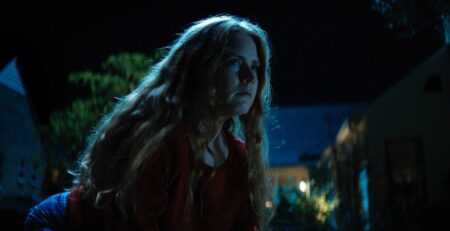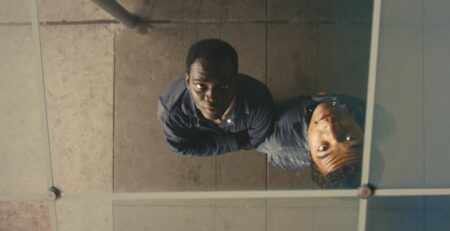
A Journal For Jordan, directed by Denzel Washington and written by Virgil Williams, is a Columbia Pictures/BRON/Escape Artists production based on the memoir A Journal for Jordan: A Story of Love and Honor by Dana Canedy, which is an expansion of her New York Times article “From Father to Son, Last Words to Live By”. The film centers on Canedy (Chanté Adams) and her relationship with 1st Seargent Charles King (Michael B. Jordan), which eventually resulted in the birth of their son Jordan. Before he’s deployed to Iraq, Dana gives Charles a journal which he fills with fatherly advice for Jordan.
When I first heard about A Journal For Jordan, it definitely piqued my interest. Michael B. Jordan has grown into one of my favorite actors, starring in blockbuster hits such as Black Panther and even transitioning into producing with his Outlier Society banner. Denzel Washington is one of the most celebrated actors alive and his transition into directing has resulted in films including The Great Debaters and Fences. So on paper, the two working together should be a home run; they even serve as producers on the film. However, a few factors end up hobbling the film.
Chief among them is the chemistry, or rather, the lack of it between Jordan and Adams. Jordan has tamped down his trademark charisma, coming off as oddly stiff. Maybe he’s trying to emulate how King was in real life, but every role he’s played-from voicing Julian Chase in gen: LOCK to the quiet fury of John Kelly in Without Remorse-has left me with my eyes glued to the screen. Here, not so much. Given that King died during a tour of duty in Baghdad, it’s baffling that the audience isn’t given a chance to connect with the man beyond surface details such as his taste in music and his art skills. It also marks a very important question: what does Dana see in the guy, other than perfectly chiseled abs? Adams does most of the heavy lifting emotionally, including a scene that feels contrived for dramatic purposes when they attempt a long-distance relationship, and she excels at it. As this is her first major feature film, I hope that casting directors keep an eye on her after this film.
A Journal For Jordan also feels extremely discombobulated due to its random time jumps. First, it starts in 1993, then leaps to the early 2000s and then ends in 2018. Somebody should have told Williams and editor Hughes Winborne to shape the story in a way that unfolds naturally, as Jordan goes from a newborn to a year old to a teenager in the space of a few scenes. And Jordan himself doesn’t really play into the narrative, which is weird given that the film is literally about his father writing to him; it isn’t until he hits adolescence that he starts to learn about his father. There’s also the matter of Jalon Christian, who plays teenage Jordan. Dana mentions that her family often inherits light skin on her mother’s side, but Jordan grows up to be lighter than his parents, to the point where he could pass for a white kid. To say it’s jarring would be an understatement.
However, the third act is where Washington really excels as A Journal For Jordan touches upon all of the lessons King wanted to impart to his son. Jordan has just come home after getting into a fight with another boy, and Dana digs out the journal to reveal one of his father’s lessons: that it’s perfectly all right to cry. And cry he does. Washington doesn’t delve into melodrama or schmaltz during the final stretch; each emotional beat, especially the ending, hits perfectly. It’s enough to make one wonder what happened with the rest of the film.
A Journal For Jordan is a rare misfire from Michael B. Jordan acting-wise and Denzel Washington directing-wise, though Chante Adams’ performance and the final act are standouts. I hope that Washington’s performance in The Tragedy Of Macbeth and Jordan’s directorial debut for Creed III fare far better.
A Journal For Jordan will premiere in theaters nationwide on December 24, 2021.
A Journal For Jordan
-
Rating - 6.5/106.5/10
TL;DR
A Journal For Jordan is a rare misfire from Michael B. Jordan acting-wise and Denzel Washington directing-wise, though Chante Adams’ performance and the final act are standouts. I hope that Washington’s performance in The Tragedy Of Macbeth and Jordan’s directorial debut for Creed III fare far better.




